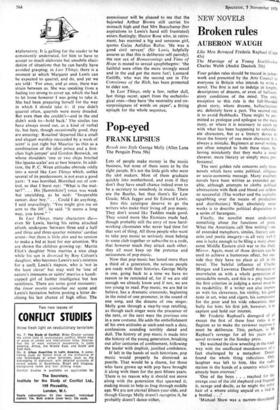Pop-eyed
FRANK LIPSIUS
Revolt into Style George Melly (Allen Lane The Penguin Press 50s) Lots of people make money in the music business, but none of them seem to be the right people. It's not the little girls who were the idol makers. Most of them graduate quickly into motherhood, and even if they don't they have small chance indeed even to be a secretary to somebody in music. There are the Beatles, but then there's Sir Lew Grade; Mick Jagger and Sir Edward Lewis.
Into this catalogue deserve to go the writers who make their living off pop music. They don't sound like Teddies made good. They sound more like Etonians made bad, though probably still the envy of now hard- working classmates who never had time for that sort of thing. All those people who want to take pop music so seriously must belong to some club together or subscribe to a code, that however much they attack each other, they all must keep up the pretence and seriousness of pop music.
Now that pop music has lasted more than a third of a generation, the serious people are ready with their histories. George Melly is one, going back to a time we have no reason to be reminded of, for if we are old enough we already know and if not, we are too young to read. Pop music, we are led to believe, has a dramatic crescendo, beginning in the mind of one promoter, in the sound of one song, and the dreams of one singer. Melly goes through a step-by-step retelling, as though each singer were the precursor of the next, or the next were the previous one in a new costume. He adds the embellishment of his own attitudes at such-and-such a date, confessions sounding terribly dated and dull. The history of pop music is made into the history of the young generation, breaking out after centuries of confinement, following the leader with implicit, justified confidence.
If left in the hands of such historians, pop music would properly be dismissed as puerile. That would be a shame, for those who have grown up with pop have brought it along with them for the past fifteen years. There is no reason why it should not move along with the generation that spawned it, making music to help us frug through middle age. We re not eternal fifteen-year-olds, and though George Melly doesn't recognise it, he probably doesn't dance either,






















































 Previous page
Previous page